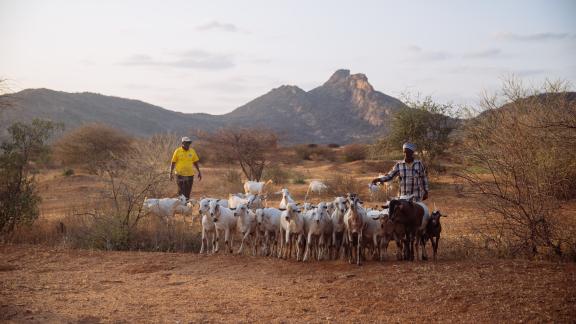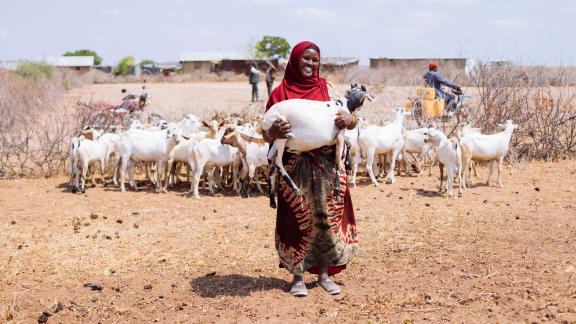Marsabit County is rewriting its story of survival. Once dependent almost entirely on pastoralism, communities are now turning to businesses, gardens and collective action to a future in the face of climate change.
In the arid stretches of Marsabit County, resilience in no longer just a word – it is practice. Communities that have weathered the extremes of drought and floods are now turning to collective action, pooling their skills and ideas to diversify their livelihoods. The shift is subtle but profound: a community historically defined by pastoralism is embracing business ventures that promise not only survival, but also growth.
“Eight community-managed groups across eight villages have received grants through support from Australian Aid and Oxfam in Kenya to build resilience against drought and other shocks. The groups designed their own proposals, ensuring the projects were sustainable, measurable and rooted in recovery,” says Golicha Wario, Senior Programmes Officer at Strategies for Northern Development (SND).

Adam Sharamo of Turbo Group with the group's herd. Photo: Peter Irungu.
Most groups chose goat restocking – buying, fattening and selling goats and goat milk for profit. Others invested in retail and wholesale shops, butcheries, or ventured into kitchen gardening. With borehole water piped into gardens and distributed through drip irrigation, spinach, kale, onions, tomatoes, and bell peppers now thrive in a land once considered barren. Two groups are even practicing bee keeping.
These ventures might seem modest, but they mark a mind-set shift. Marsabit communities are no longer waiting for the next drought to undo them – they are preparing for it together through entrepreneurship – blending it with their pastoralist heritage.
Mifugo ni Mali Group
On the first day of February 2025, the women of Mifugo ni Mali received KSh500,000 from SND and Oxfam. Within days, they bought 50 goats, at a cost of KSh237,000. When they later sold the goats for KSh364,000, the group deposited profits into their account and reinvested in 40 more goats. “We chose keeping livestock as a business because it is our best option as pastoralist women,” says Galmo, the group’s chairlady. “With this business, we do not have to walk long distances. This is our life now, and we will keep going.”
Today, the women manage the goats with a careful eye on market timing, to track price fluctuations. From the 21 female goats they bought, the herd has doubled, producing milk that adds to their income.

Galma Molu Huko of Mifugo ni Mali Group holds up one of the group's goats. Photo: Peter Irungu.
“We have supported our children with school supplies – books, pens and sanitary pads for our girls”, shares Galmo. “We gave three university students from group families KSH10,000 each as a loan for their school needs.”
“We have supported our children with school supplies – books, pens and sanitary pads for our girls”, shares Galmo. “We gave three university students from group families KSH10,000 each as a loan for their school needs.”
Their ambitions stretch further: they plant trees in nearby schools and plan to build a social hall that can be rented for community events. Already, they rent out a public address system for KSh1,500 per day.
Turbi Disability Group
Formed in 2023 with just five members, the Turbi Disability Group now counts 24. With monthly contributions of KSh200 per member, they built a foundation of trust and commitment. After receiving their grant in February 2025, the group has already completed two goat-rearing cycles and is currently managing 65 goats, waiting for the best time to take them to the market. They also invested in buying and selling diesel, saving an impressive Ksh750,000 by July.
“It is not uncommon for persons with disability to be discriminated against. We have seen it in our community – most of us are left out,” says Mzee Mamo, a member of the group. “We formed this group to show that we matter, that we have rights, too. That is why we are so grateful to SND and their donors for recognizing us.”
Beyond their group, they have supported children of at least seven people living with disability – paying school fees and easing household burdens.

Mamo Godana Guyo of Turbo Disability Group herding the group's livestock in Turbi, Marsabit. Photo: Peter Irungu.
“The day we learned we were told by SND that we would get the grant, we were overjoyed”, recalls Mzee Mamo. “We had interviewed with six other groups and did not think we stood a chance. We are so thankful. May God bless SND and the donors one hundred times over.”
“The day we learned we were told by SND that we would get the grant, we were overjoyed”, recalls Mzee Mamo. “We had interviewed with six other groups and did not think we stood a chance. We are so thankful. May God bless SND and the donors one hundred times over. ”
Marsabit has long lived under the weight of climate extremes. Recurring droughts and flash floods have devastated herds, emptied granaries, and left communities vulnerable. But a shift is underway. Groups are now building safety nets together – by investing in different ventures and in themselves.
The drought will come again – the community knows this. But this time, they will meet it with herds that multiply, gardens that bloom, and the shared strength of working together.
